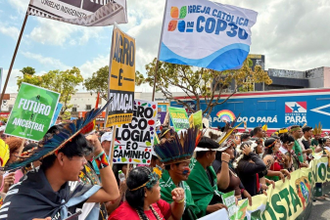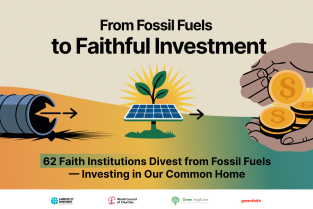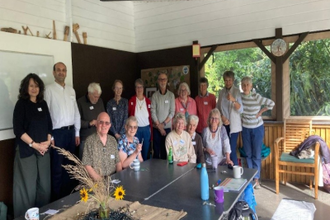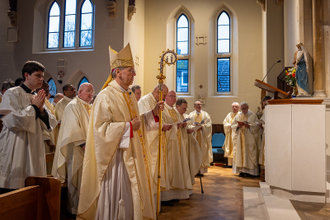Ecological Conversions of the Animators
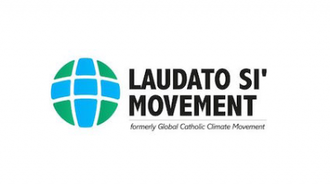
With the Season of Creation approaching (1 September - 4 October) - I wanted to take a closer look at what an ecological conversion entails. Pope Francis has some causes very close to his heart. Ecumenism and inclusivity for instance. Tackling clericalism and environmental degradation are two others.
All of them matter, but the one I am concerned with here is ecological conversion. In fact, the Pope doesn't think that we can tackle environmental degradation, which has reached a critical stage, without undergoing an ecological conversion.
In his talk to young people in France in 2020, Pope Francis explained that his ecological conversion occurred during the 8 years between 2007, when he attended the Conference of the Latin American Episcopate in Aparecida, Brazil, and 2015, when he wrote the Encyclical Laudato Si' - "From Aparecida to Laudato Si' was, for me, an inner journey", a "journey of ecological conversion".
He said: "there will be no new relationship with nature without a new human being". The human heart needs to be healed from its selfishness, its greed, its pride and its claim to be the master and despot of the world, he said.
To him, an ecological conversion means the harmonising of thinking, feeling and doing, with tenderness imbuing all. He wants us to realise that our roots are interrelated with nature, because that realisation will encourage us to live in harmony with creation.
The Laudato Si' Movement (LSM)'s Animators - those people, mainly Catholics, who have taken the online Course provided by LSM to educate and inspire action to tackle the environmental crises - have embraced ecological conversion.
Having looked at Pope Francis' personal interpretation of ecological conversion, I wondered what individual Animators' interpretations of it might be.
So I asked them.
John told me that the Encyclical Laudato Si' changed his life. (Yes, I think it changed all of our lives). He thinks that "any eco-conversion has to start with yourself and a serious look at your home life". Lockdown gave him the opportunity to clear out loads of stuff from his home, the sort of inessentials that we all seem to amass. It also enabled him to start the practice of contemplating creation in his garden. This spiritual exercise has boosted his ecological conversion.
He sees his tasks now as, among other actions, working to spread knowledge of the Encyclical and the Laudato Si' Action Platform in his parish and in wider communities.
Susan, like John, saw the positive side of lockdown, in that it provided an opportunity to pause and reflect on our lifestyles. It forced people to face the environmental crises and to realise that we humans, individually and en masse, are responsible.
She tells me that, through studying the LSM Course in 2020, she learned to read nature and creation as a revelation of God. "The way I practise my religion now is totally different" she says. Her life has undergone "fundamental changes".
Like John she spends more time with nature, which has increased her sense of wonder "at the beauty and balance which exists there". To reduce packaging, she buys unwrapped fruit and vegetables, and to reduce her carbon footprint she is trying to eliminate meat from her diet. She has taken to cycling as a way of exercising while at the same time appreciating nature.
Martin shares John and Susan's feeling that connecting with nature is a priority for achieving an ecological conversion. He thinks we should make time every day to do this, to help us see God in everything.
Anne studied hard as a way to understand ecology and the natural environment, which she was deeply interested in, and she worked to help reduce poverty.
What sparked her ecological conversion was 'The Time is Now' lobby of parliament in 2019.
She realised for the first time that poverty, life expectancy and environmental breakdown were the result of the climate and environmental crises, and that supporting overseas aid was tackling the symptoms, not the causes, and that the situation would not improve unless and until the climate and environmental crises were tackled. That was her ecological conversion.
She looked to her home life, as Susan and John did, and along with other changes she reduced dairy consumption, cut out meat, insulated her house and reduced dependence on car transport. She has also taken the message to her parish and beyond.
Like more and more Catholics, she realises that more must be done, and that we need to join with others to take direct action. "We can't allow this degradation of our environment and loss of life to continue".
Sean was attracted to nature by the Bristol Natural History Unit (he lives in Bristol). He began to notice the scarcity of wildlife in the Nature Reserves the Unit had in their programmes. Then he noticed the alarming drop in insect numbers and species. His experience of an ecological conversion is that it never stops. It is always continuing and evolving.
To keep his spirits up he occasionally visits areas in Scotland where wild bird and mammal species that are generally disappearing can still be seen and heard. And, as is the norm for an Animator, he takes the Encyclical's message to his parish.
Menchu's eco conversion came slowly, bit by bit. She had always loved plants. When she was very young she lived in the Sahara Desert, so she learned from an early age how precious a resource water is. She learned about botany and ecosystems at university, but it was when she started studying German that she learned a lot about the eco-friendly things they were doing in Germany - home-composting, recycling etc, which started her on the same path.
When she lived in Spain she felt the climate and environment problems at first hand; water scarcity, droughts and fires. It was in England that her 'war' against plastics started, especially after she took the LSM Animators' Course in 2021. She now helps other Animators find their way in the Course.
So, her ecological conversion has been slow but sure, the result of following the gentle promptings of the Holy Spirit - "the Holy Spirit has led me softly here". As with Sean, her conversion is still continuing.
Peter's ecological conversion started when the OU Course he took in 2009, 'Innovation: Designing for the Environment', opened his "heart and conscience for our abused ecology". When in the same year typhoon Ondoy devastated the north of the Philippines, Peter's home country, climate change became very real to him. Further typhoons swept over the country, firmly nailing his personal commitment to tackling the environmental crises. He was involved in fundraising projects, but like Anne he realised that the cause of the problems needed tackling.
He started with changing his lifestyles - he switched to energy provider Ecotricity, reduced car journeys and changed to a much more plant-based diet.
After Pope Francis' Laudato Si' encyclical on the care for our common home in 2015, the Laudato Si' Movement promoted the creation of Laudato Si' Circles around the world. These Circles, where people pray, reflect and act together, very much attracted him. It took time, but eventually Peter was able to form a Laudato Si' Circle in his parish, and he now also actively campaigns in his wider community.
His ecological conversion took him many years, 12 or more, to reach his current stage of personal eco-journey.
For myself, I loved animals as a young child, which surely most children do, but hearing of no other people who felt as I did, I accepted the way of the world. Then in 1972 or thereabouts I saw a poster for a jumble sale on behalf of the Anti-Vivisection Society. After seeing this example of campaigning for justice, nothing could hold me back. And my campaigning embraced the natural environment, which is the home for all beings, and which people knew was being destroyed since the publication of the book 'Silent Spring' in 1962.
My ecological conversion - or perhaps ecological confirmation would better describe it - can be stated as learning and living the lesson that you have to actively follow your eco-conscience, even if you think you are the only person in the world with your view.
LINKS
Season of Creation: https://laudatosimovement.org/season-of-creation/
Laudato Si Platform: https://laudatosiactionplatform.org/
Laudato Si Course: https://laudatosianimators.org/



